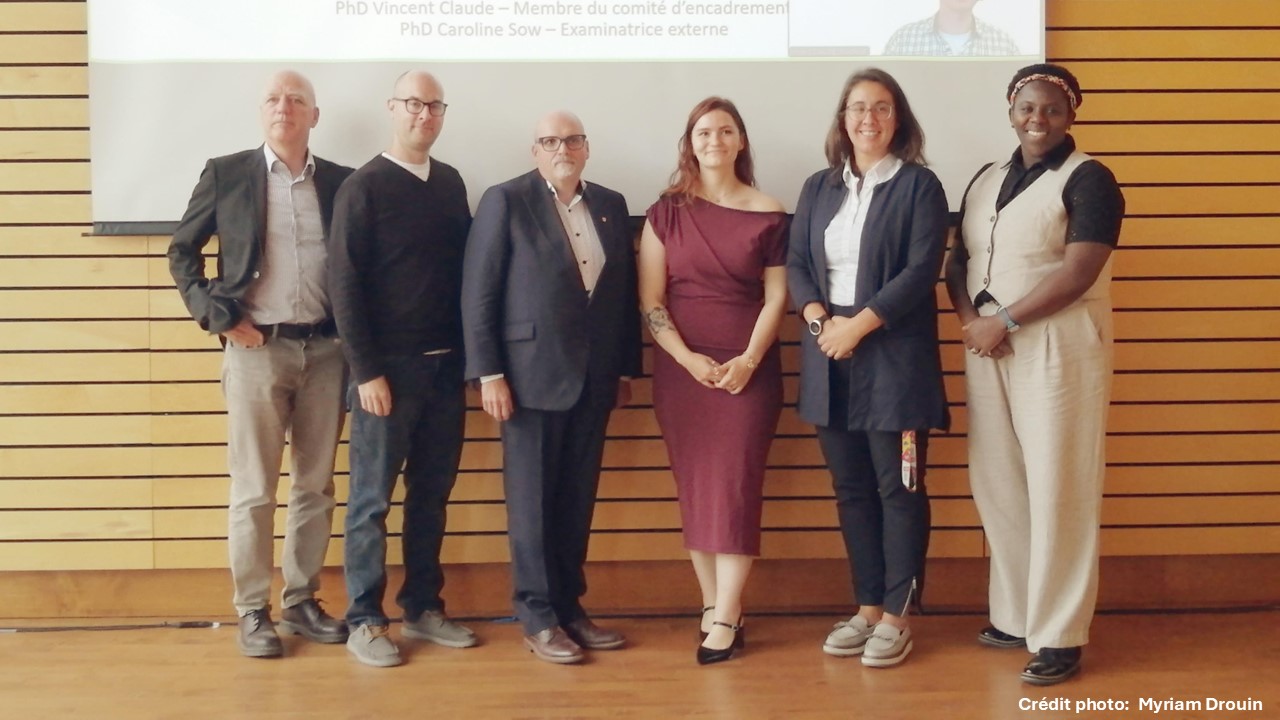Congratulations to Alex Mary on his successful PhD defence!
Alex Mary successfully defended her doctoral thesis in wood and bio-based materials engineering on September 24, 2024, under the supervision of Véronic Landry (Faculty of Forestry, Geography, and Geomatics, Laval University) and the co-supervision of Pierre Blanchet (Faculty of Forestry, Geography, and Geomatics, Laval University). Her thesis focuses on developing bio-based adhesives for engineered wood products in response to growing environmental and sustainability demands.
Congratulations, Alex, on this remarkable milestone in your academic career! We wish you a bright future filled with professional success and many achievements.
The jury members were:
- Mr. André Desrochers (President, FFGG),
- Véronic Landry (Research Director, FFGG),
- Mr. Pierre Blanchet (Co-supervisor, FFGG),
- Mr. Christian Dagenais (Examiner, UL),
- Mr. Vincent Claude (External Examiner, Buildwise),
- Ms. Caroline Sow (External Examiner, Adhésifs Proma Inc.).

From left to right: André Desrochers, Christian Dagenais, Pierre Blanchet, Alex Mary, Véronic Landry and Caroline Sow
Thesis title: Development of bio-based adhesives for engineered wood products
The global construction industry accounts for almost 40% of annual greenhouse gas emissions, contributing significantly to the planet’s carbon footprint and exerting a considerable impact on climate change. One recommended strategy for addressing this problem is to increase the use of wood in building construction. As a renewable resource, sustainably harvested wood in Quebec can temporarily sequester carbon in structures. The increased use of wood is made possible by an innovative technology: cross-laminated timber. This technology offers two major advantages: improved energy efficiency and a significant reduction in construction site waste.
However, the adhesives used in manufacturing cross-laminated timber panels are synthetic, and while effective for wood structures, they rely heavily on fossil-based materials, including formaldehyde, a substance classified as carcinogenic to humans and animals by the World Health Organization. Since 2021, stricter regulations have been implemented through the “Formaldehyde Emissions from Composite Wood Products Regulations” under the Canadian Environmental Protection Act. Moreover, the non-fusible, non-recyclable nature of petrochemical adhesives significantly impacts the end-of-life disposal of cross-laminated timber. Therefore, developing bio-based adhesives for wood construction has become imperative.
This project aims to address these issues by developing biobased adhesives adapted to engineered wood products, particularly cross-laminated timber, to improve their environmental footprint. The chosen strategy focuses on the development of polyurethane adhesives, composed of an isocyanate and a polyol. These formaldehyde-free adhesives give wood panels exceptional durability compared with synthetic adhesives, but they are often prepared from petroleum-based raw materials. In this project, different strategies were developed and investigated to reduce the dependence of adhesives on petroleum-based compounds, while preserving the properties of structural adhesives. To this end, proteins, as biological macromolecules, were selected. Abundant, non-toxic and renewable, proteins are also capable of improving the adhesion of adhesives to wood.
In the first phase of this project, proteins were extracted from Quebec industrial co-products and incorporated into polyurethane adhesive formulations to replace polyol, at different substitution rates. The incorporation of proteins into polyurethane adhesive formulations proved beneficial for the mechanical properties of the various adhesives. Next, a partial substitution of the isocyanate by a partially biobased isocyanate was carried out, in addition to the substitution of the polyol. This step proved critical for mechanical performance, significantly impacting it, and demonstrated the importance of isocyanate structure. Finally, a major polyol substitution was carried out with dairy proteins. This led to the creation of a biosourced adhesive, in compliance with the US Department of Agriculture’s BioPreferred® certification, which boasts improved mechanical strength and better delamination resistance than its petrochemical counterpart. In addition, this biobased adhesive has demonstrated a capacity for biodegradation, thus potentially contributing to improving the life cycle of cross-laminated timber.

